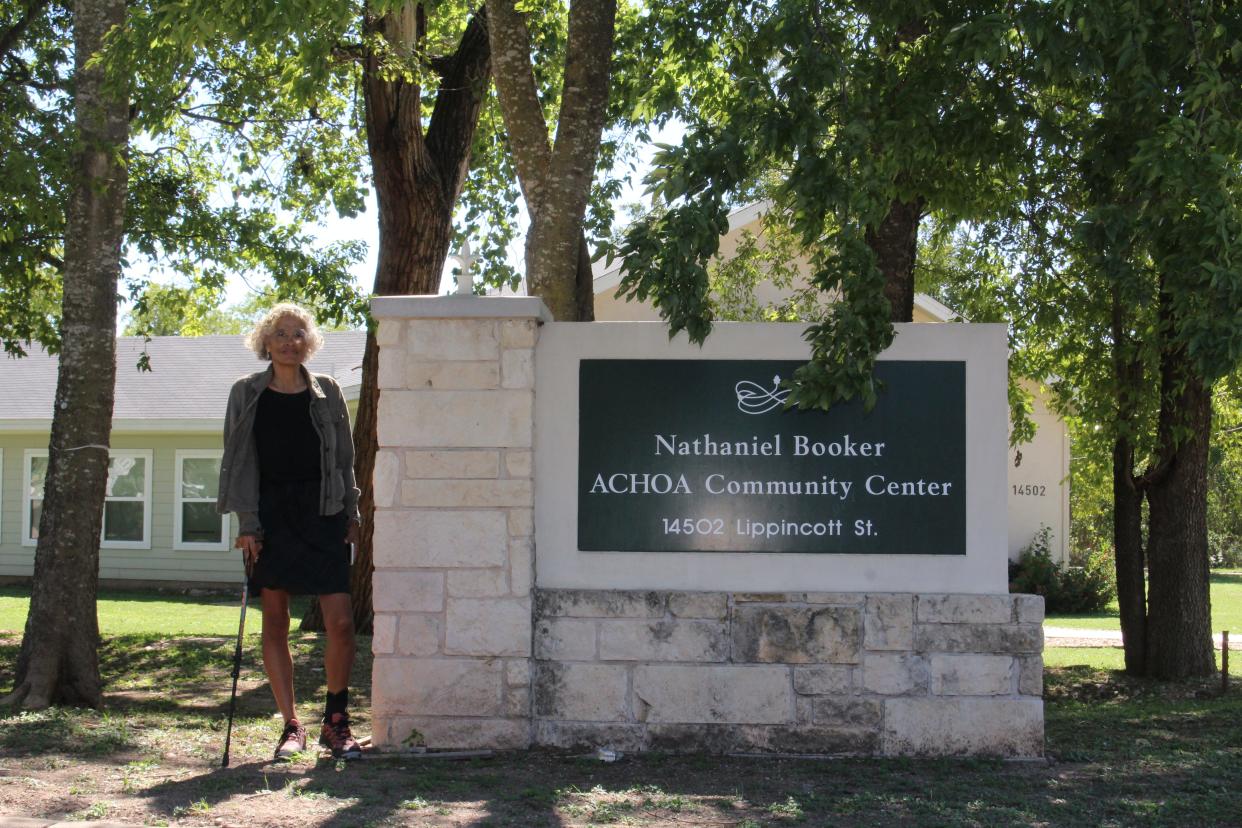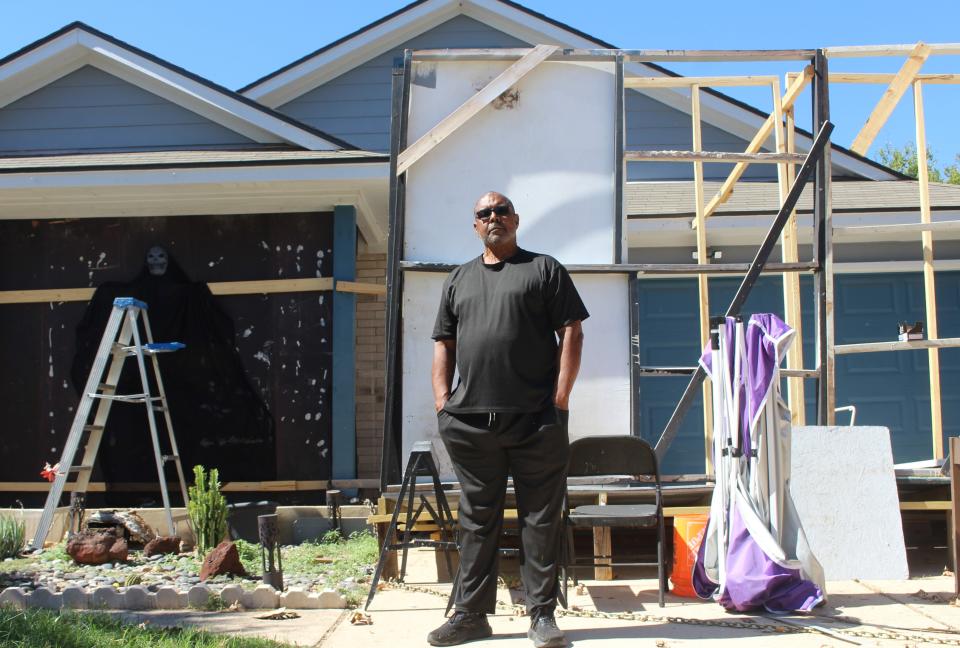Here's why residents of eastern Travis County community want answers about water quality

Editor’s note: This story was updated after its initial publication to include responses from Texas Water Utilities, the water provider in Austin's Colony. It was also updated to reflect that the water does not contain high levels of lead.
HORNSBY BEND — In the seven years since Keree Brannen bought a newly built house in Austin’s Colony — a string of developments in the Hornsby Bend unincorporated community in eastern Travis County — she has had to replace her sink fixtures, water heater, water pipes and toilet.
The culprit, she said, was her water supply.
“The water smelled like stagnant water,” said Brannen, a government worker. The crust on her toilet “was like plaque” on a “mouth that isn’t brushed.”
On Saturday morning, as many Central Texas residents prepared to watch the eclipse, Brannen and more than three dozen others crowded into a small community center meeting room to explore a difficult question — how to approach a neighborhood concern of more than a decade over water quality and pricing.
Residents' frustrations stem from the “hard” quality of the water.
Texas Water Utilities, a subsidiary of the national for-profit SouthWest Water Co., provides the area with water. Its most recent Drinking Water Quality Report indicates that the water the company provides to the area meets state and federal standards.
Other concerns in Travis County: Fear in New Sweden: Residents fight back against concrete plant plans in heart of Texas
However, many residents said they experience regular inconveniences due to the water: irritated scalp and skin; staid water scents; intermittent water discolorations; broken water heaters, coffee pots, washing machines and pipe systems from corrosion; plaquelike calcium crusts that form in their toilets, bathtubs and sinks and are difficult to clean.
Texas Water Utilities is aware of those hard water conditions, which are caused by calcium bicarbonate, magnesium carbonate and other naturally occurring minerals in groundwater, said Tim Williford, vice president of operations at Texas Water Utilities. Magnesium and calcium do not have harmful health effects or affect water safety, he said.
"Hard water is not unique to our Hornsby Bend system, and is commonly found in cities that utilize groundwater as a drinking water source in Central Texas," Williford said in an email to the American-Statesman. "Delivering clean water is our business and Austin’s Colony drinking water continues to meet or exceed the water quality standards established by the Texas Commission on Environmental Quality and the U.S. Environmental Protection Agency."
Concerns about costs associated with water
Frustrations extend to what residents say are high base fees from provider SouthWest Water Co., which start at $92 a month but can grow $40 or $50 higher even without use, residents say.
“People go on vacation and come back to a $150 bill,” longtime resident and retired businessman Richard Franklin said, “without having turned the water on.”
Williford said that, as a regulated company, Texas Water Utilities is required to charge rates that have been reviewed and approved by the Public Utility Commission of Texas "and are fair to all customers."

For the past two decades, relatively low housing costs and the location — Austin’s Colony is about 10 miles east of downtown — have attracted many to scattered unincorporated communities east of U.S. 183. Brannen chose Austin’s Colony because she found it advertised by developers as an area where she would qualify as a first-time homebuyer. Resident Nicole Clark moved to Austin’s Colony in 2001 from Northeast Austin because mortgage payments and taxes were lower. Franklin came at about the same time because of the rising rent on the city’s southwest side.
These factors are part of what has made Austin’s Colony a diverse area. More than 4 in 5 residents are Black or Latino, according to the most recent census numbers. The attractive affordability of the area, however, is increasingly put at risk by the indirect costs of living with their water provider, numerous residents told the American-Statesman.
Clark said she has spent more than $8,000 on three water softener systems, three water heaters and two toilets during her two decades as a resident. This, she said, does not include the extra $50 a month she spends on drinking water and the $10 to $40 she spends on the salt or magnesium she needs to keep her water softener working.
How has Texas Water Utilities responded?
Williford, the Texas Water Utilities official, said the agency has "an open line of communications" with homeowner association representatives about planned system improvement projects and community service activities in the area. Those representatives have not voiced concerns about water quality and costs of service, according to Williford.
Williford said in an email that the Texas Water Utilities system in Hornsby Bend invested a total of $5.5 million in infrastructure in 2022 and 2023. Those projects included upgrades to a wastewater treatment plant lift station and planning and design for a wastewater treatment facility expansion to meet projected growth in the area.
If Texas Water Utilities receives water quality complaints, operations staffers are sent to the address to check for chlorine residuals, adequate pressure and water clarity, Williford said. The agency can also flush the neighborhood lines if those checks deem it would be helpful.
Residents discuss next steps
Many neighbors echoed Brannen's and Clark’s experiences Saturday morning. The broad consensus was that ditching SouthWest Water would be ideal, though the path ahead remains blurry.
Many would like to apply for permission to join Austin Water, the city’s water service. Yet residents remain divided on the question of annexation into Austin and on the feasibility of applying for an exemption from SouthWest Water’s state-designated jurisdiction, a move they saw Tesla maneuver for its nearby gigafactory in recent years. It might not even be possible, and if it is, hefty funds would be required to attempt such a legal battle.
“We’re a cash cow for a private water company,” Franklin said. “They’re not just going to let us go.”
At Saturday’s meeting, organizers from the East Austin-based group People Organized in Defense of Earth and her Resources and the neighborhood group Hornsby Bend Alliance surveyed community opinion for next steps. Many said they would like to start a working group that looks for federal dollars for which it may qualify.
The community’s quiet nature has often been one of its selling points, Brannen said, but that means its problems are often overlooked. To overcome that, Franklin said he hopes the neighborhood stays “hot” about the issue so that residents can prove they will demand more than the minimum standards.
“There are a lot of people that think that as long as we’re OK with the standards the way they are, then everything must be fine. But when you are experiencing it, you know it's not fine,” he said. “You have to say, ‘Look, what you’re doing right now is not enough.’”
This article originally appeared on Austin American-Statesman: Here's what some Travis County residents say about water quality

